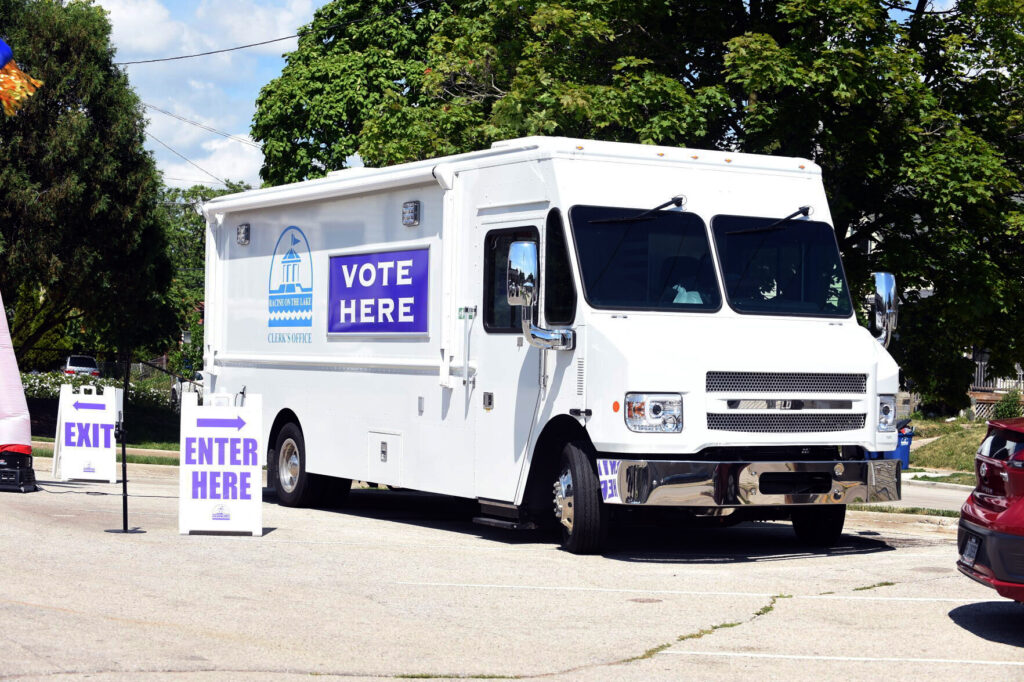Wisconsin Supreme Court To Hear Legal Challenge to Early Voting Sites

Wisconsin’s highest court will hear arguments next week in a lawsuit against the city clerk of Racine and the Wisconsin Elections Commission (WEC) that could impact the availability of alternate absentee voting sites.
Oral argument is scheduled for Sept. 10 in the lawsuit brought in December 2022 by the Wisconsin Institute for Law & Liberty (WILL), a conservative group, on behalf of a Wisconsin voter against the city clerk of Racine and the WEC.
The case began as an administrative complaint centered on whether Racine violated Wisconsin law by allowing voters to cast absentee ballots at an “election van” that moved from place to place to allow for early in-person absentee voting during the August 2022 primary and the November 2022 midterm elections.
Under Wisconsin law, alternate absentee ballot sites “shall be located as near as practicable to the office of the municipal clerk or board of election commissioners,” and “no site may be designated that affords an advantage to any political party.” The plaintiffs allege 21 alternate sites for the 2022 elections were not in legal proximity to the clerk’s office.
WEC dismissed the original complaint in November of 2022, stating “the Commission finds no probable cause to believe a violation of law or abuse of discretion has occurred with regard to the City of Racine’s use of alternate absentee voting sites and mobile facilities.”
The order allowed Racine to continue utilizing in-person alternate absentee ballot sites. The plaintiffs appealed and asked a circuit court to reverse WEC’s dismissal.
In January, the court sided partially with the plaintiffs, determining the use of mobile vans as absentee voting sites does violate Wisconsin law, but in-person absentee voting sites more broadly do not need to be located as close as practicable to the clerk’s office. The judge also held that Racine’s distribution of in-person absentee voting sites unlawfully afforded an advantage to the Democratic Party.
In a trial court brief, Wisconsin election officials stressed the major implications of a decision against Racine’s use of mobile voting sites, stating that it could cause “some municipalities [to] unnecessarily limit the number and location of absentee voting sites, thereby impinging voters’ ability to effectively cast a ballot.”
Following the trial court decision, multiple parties involved in the suit, including the Democratic National Committee (DNC), asked the Wisconsin Supreme Court to review the case, which the court granted in May.
The pro-voting groups argue the case is ultimately about whether Wisconsin voters will be provided “the degree of ballot access to which they are entitled under law.” The DNC asked the court to affirm WEC’s decision.
In a brief submitted to the Wisconsin Supreme Court, the city of Racine defended the voting sites in court, arguing the plaintiffs are wrongly interpreting the law.
A municipality is prohibited from using sites “that provide an actual, demonstrable, advantage to any political party,” attorneys wrote in July. “This includes sites that are located at a political party headquarters, rallies held by political parties, or other similar instances in which a site is providing a readily apparent advantage to a political party.”
“Nothing before this Court nor before the WEC has established that any political party has been actually advantaged,” the brief said. The defendants are asking the high court to “determine the meaning of the statue via its plain language.”
While the case is pending, the majority-liberal high court in June granted a motion from WEC to pause a portion of the lower court’s opinion holding that Racine’s voting sites illegally helped the Democratic Party.